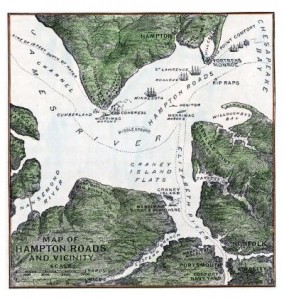 White Southern Baptist anger continues following the Lincoln administration’s recent decision to allow loyal ministers to assume the leadership of vacant, pastor-less or openly disloyal churches within Union-controlled areas of the rebellion. Baptist newspaper editors decry religious liberty violations and warn their readers of the horrors of black preachers defiling church pulpits. Northern Baptist ministers, who are now filling some Baptist pulpits of the South, believe they are implementing congregational freedom, a position that resonates with former slaves.
White Southern Baptist anger continues following the Lincoln administration’s recent decision to allow loyal ministers to assume the leadership of vacant, pastor-less or openly disloyal churches within Union-controlled areas of the rebellion. Baptist newspaper editors decry religious liberty violations and warn their readers of the horrors of black preachers defiling church pulpits. Northern Baptist ministers, who are now filling some Baptist pulpits of the South, believe they are implementing congregational freedom, a position that resonates with former slaves.
Religious tensions are especially high in Union-controlled Portsmouth, Virginia, where a number of Baptist churches are now supervised by Union officials whose task is to ensure that federal officers and soldiers and former slaves are treated respectfully.
This week an incident happens during Sunday worship in Portsmouth’s Court Street Baptist Church, a congregation whose pulpit remains filled by a Southern Baptist minister. Word reaches the city’s provost marshal concerning a certain member who was perceived as being disrespectful during a prayer for U.S. President Abraham Lincoln, and was subsequently arrested by Union authorities.The offender was soon released, following a written apology.
Today, the city official writes to the pastor of Court Street Baptist, warning him against allowing his church members to demean Lincoln.
From the Richmond Daily Dispatch:
Provost Marshal’s Office,
Portsmouth, March 15, 1864Rev Chas E. W Dobbs,
Court Street Baptist Church:Sir — On Sunday last, at the reading of the prayer in the morning service for the President of the United States, Mrs Susan Williams, a member of the congregation, behaved in a very improper and disrespectful manner. Complaints were made at this office, and Mrs. Williams was arrested. She was released upon writing the enclosed humble apology, which you will please read from your pulpit for the benefit of the parties offended, and at the same time admonish the disloyal of your congregation that, hereafter, a mere apology will not atone for so grave an offence as that committed by Mrs. Williams.
Very respectfully,
Your obedient servant,
Daniel Messinger,
Provost Marshal.
The Dispatch publishes only a few words of Mrs. Williams’ apology:
Wherewith follows the poor woman’s apology, that “she meant no disrespect to the minister who prayed, or to the President in authority, or to those in authority for whom he was praying.”
Source: “One of the Portsmouth Orders,” Richmond Daily Dispatch, June 6, 1864 (link)


